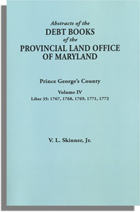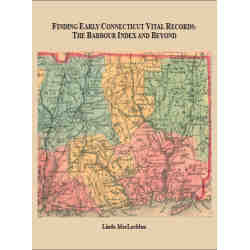Description
The Provincial Land Office of Maryland was responsible for distributing land from 1634 to 1777 on behalf of the Lord Proprietor. Land owners acquired their plots by means of a warrant, followed by a patent. Information concerning these land records is found in the Warrants and Patents series of the Provincial Land Office located at the Maryland State Archives. The late Peter Wilson Coldham indexed the records in his five-volume series Settlers of Maryland, published by the Genealogical Publishing Company.
Owing to England’s “Glorious Revolution,” the Lord Proprietor’s personal hold on land affairs was much weakened during the period from 1689 to 1715. However, it was immediately revived when his proprietary rights were restored in 1715 (Hartsook and Skordas, Land Office and Prerogative Court Records). The Lord Proprietor’s rent rolls and the debt books, the means by which the Lord Proprietor kept track of the rents due him, both commence in 1715 (though some are no longer extant).
Each piece of land granted by the Lord Proprietor was subject to a yearly rent according to the terms of the patent. The surviving rent rolls consist of entries for each tract of land patented, plus the name of the person for whom the land was originally surveyed, the present owner, the acreage, and the rent. Alienations, or subsequent sales and leases of the piece of land, are also included.
The debt books list persons owning land, giving the names of the parcel(s) and the acreage of each tract that the person owned for each year rent was collected. They are arranged by county, by year, and then by the name of the person paying the rent. There are a total of 54 libers, covering all of Maryland’s counties.
The great value of the Provincial Land Office debt books is that they enable the genealogist to track land ownership over various years in cases of intestate estates, land inherited by women, and land that is not specified in a will. They are now the basis of a new series of record abstracts from Vernon L. Skinner, compiler of the 42-volume series covering the Testamentary Proceedings of the Prerogative Court of Maryland.
Abstracts of the Debt Books of the Provincial Land Office of Maryland is arranged by county. This is the fourth volume covering Prince George’s County, Maryland. Its debt books are extant for 1750 to 1772, with breaks. The information in this series is presented in a tabular form as follows: liber and folio citation, with any pertinent date; name of the person paying the taxes; and name of the tract of land and amount of acreage. Each Prince George’s County volume is indexed by the name of the land owner and his/her track, and, on average, each volume identifies about 10,000 parcels of land. Mr. Skinner notes that the debt books reveal that (1) the communities of Mill Town, Queen Ann, and Marlboro/Upper Marlboro were well established by this period; (2) the county had already instituted a “Free School”; and (3) Benedict Calvert was the county’s largest landowner, with 7,000 acres.






Reviews
There are no reviews yet.